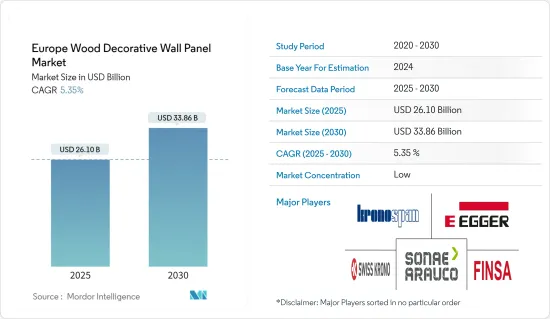
유럽의 목재 벽장식 패널 시장 규모는 2025년에 261억 달러로 예측되고, 2030년에는 338억 6,000만 달러에 이를 것으로 예측되며, 예측 기간(2025-2030년)의 연평균 성장율(CAGR)은 5.35%입니다.

유럽의 목재 벽장식 패널 시장은 소비자 선호도의 변화와 지속 가능성에 대한 강조로 인해 견고한 성장을 하고 있습니다. 건축 유산과 디자인 감성으로 유명한 유럽은 목재 벽장식 패널의 중심지가 되었습니다.
이러한 성장의 주요 촉매제는 지속 가능한 건축 자재에 대한 수요 증가입니다. 목재 벽장식 패널은 자연적이고 재생 가능한 소재이기 때문에 유럽의 지속 가능성 정신과 맞물려 합성 소재를 대체할 수 있는 재료로 각광받고 있습니다. 그 결과, 관리된 산림에서 공급되는 목재 패널에 대한 수요가 급증하고 있으며, 탄소 배출량을 최소화하는 것이 특징입니다.
게다가 기술적 진보도 시장을 재구성하고 있습니다. 첨단 제조 기술과 마감 기술로 목재 벽장식 패널의 내구성, 내습성 및 난연성이 향상되었습니다. 이러한 혁신은 적용 범위를 넓혀 욕실이나 주방과 같이 습기가 많은 공간에서도 사용할 수 있게 되었습니다.
지속가능하고 환경친화적인 소재에 대한 선호도가 높아지면서 유럽의 목재 벽장식 패널 시장은 특히 상업 공간에서 상당한 성장을 보이고 있습니다. 특히 호텔, 리조트, 레스토랑을 포함한 접객업 부문이 이러한 패널의 주요 소비처로 부상하고 있습니다. 이러한 패널을 사용하여 친근하고 자연스러운 분위기를 조성하여 전반적인 고객 경험을 향상시킵니다.
유럽의 환경 의식이 높아짐에 따라 목재 벽장식 패널 수요가 이어지고 있습니다. 이에 대응하여 제조업체는 제품을 다양화하고 있으며, PEFC 또는 FSC와 같은 인증된 산림으로 전환하는 경우가 많습니다. 이러한 인증은 책임감 있는 소싱과 환경 영향 최소화에 대한 제조업체의 노력을 강조합니다.
뿌리 깊은 목공 유산을 가진 유럽은 목재 제품 시장, 특히 장식용 벽 패널 분야에서 중요한 역할을 담당하고 있습니다. 특히 독일, 이탈리아, 프랑스, 스칸디나비아 3국(스웨덴, 노르웨이, 핀란드)과 같은 국가는 목공의 전통과 산업적 우수성으로 유명합니다.
탄탄한 제조업으로 유명한 독일은 특히 목공 분야에서 두각을 나타내고 있습니다. 이와 대조적으로 이탈리아는 정교한 장인 정신과 고급스러움의 대명사로 통합니다. 특히 독일에서는 소비자와 기업이 점점 더 친환경적인 옵션을 우선시하면서 지속 가능성이 각광을 받고 있습니다. 이러한 변화로 인해 환경을 고려한 방식으로 제작된 책임감 있는 목재 장식용 벽 패널에 대한 수요가 눈에 띄게 증가했습니다.
독일 제조업체들은 목재 장식용 벽면 패널의 유럽 시장 확대에 중추적인 역할을 해왔습니다. 이들은 효율적인 유통망, 전략적 파트너십, 강력한 수출 전략을 활용하여 다양한 유럽 시장에 효과적으로 진출함으로써 이를 달성했습니다.
유럽의 목재 벽장식 패널 시장은 단편화되었습니다. 이 시장은 국내외를 불문하고 다수의 제조업체로 구성되어 있어 다양한 고객의 기호와 요구에 부응하기 위해 다양한 목재 벽장식 패널을 제공합니다. 주요 주요 기업으로는 Egger Group, Kronospan, Swiss Krono Group, Finsa, Sonae Arauco 등이 있습니다.
The Europe Wood Decorative Wall Panel Market size is estimated at USD 26.10 billion in 2025, and is expected to reach USD 33.86 billion by 2030, at a CAGR of 5.35% during the forecast period (2025-2030).

The European wood decorative wall panel market is experiencing robust growth, driven by shifting consumer preferences and a heightened emphasis on sustainability. Renowned for its architectural legacy and design sensibilities, Europe has become a hotbed for wood decorative wall panels.
A key catalyst for this growth is the rising demand for sustainable construction materials. Wood decorative wall panels, being natural and renewable, have gained traction over synthetic alternatives, aligning with Europe's sustainability ethos. Consequently, there is a surge in demand for wood panels sourced from responsibly managed forests, boasting minimal environmental footprints.
Moreover, technological strides are reshaping the market. Advanced manufacturing and finishing techniques have bolstered wood decorative wall panels' durability, moisture resistance, and fire retardancy. These innovations have broadened their applications, even finding a place in moisture-prone spaces like bathrooms and kitchens.
Driven by a rising preference for sustainable and eco-friendly materials, the European market for wood decorative wall panels has seen a significant uptick, particularly in commercial spaces. Notably, the hospitality sector, including hotels, resorts, and restaurants, has emerged as a prominent consumer of these panels. It uses these panels to create a welcoming, natural atmosphere, enhancing the overall guest experience.
The rising eco-consciousness in Europe is driving the demand for wood decorative wall panels. In response, manufacturers are diversifying their offerings, frequently turning to certified forests such as PEFC or FSC. These certifications underscore the manufacturers' commitment to responsible sourcing and minimal environmental impact.
Europe, with its deep-rooted woodworking heritage, plays a significant role in the wood products market, particularly in the realm of decorative wall panels. Notably, nations like Germany, Italy, France, and the Scandinavian trio (Sweden, Norway, Finland) stand out, celebrated for their woodworking legacy and industry prowess.
Germany, known for its robust manufacturing sector, particularly shines in the woodworking arena. In contrast, Italy is synonymous with its exquisite craftsmanship, often synonymous with luxury. Notably, sustainability is taking the limelight in Germany, with consumers and businesses increasingly prioritizing eco-friendly options. This shift has led to a notable uptick in demand for responsibly sourced wood decorative wall panels crafted using environment-conscious methods.
German manufacturers have played a pivotal role in expanding the European market for wood decorative wall panels. They have achieved this by capitalizing on their efficient distribution networks, strategic partnerships, and a robust export strategy, effectively penetrating diverse European markets.
The European wood decorative wall panel market is fragmented. The market consists of numerous manufacturers, both domestic and international, offering a wide variety of wood decorative wall panels to cater to different customer preferences and requirements. Some of the major key players are Egger Group, Kronospan, Swiss Krono Group, Finsa, and Sonae Arauco.